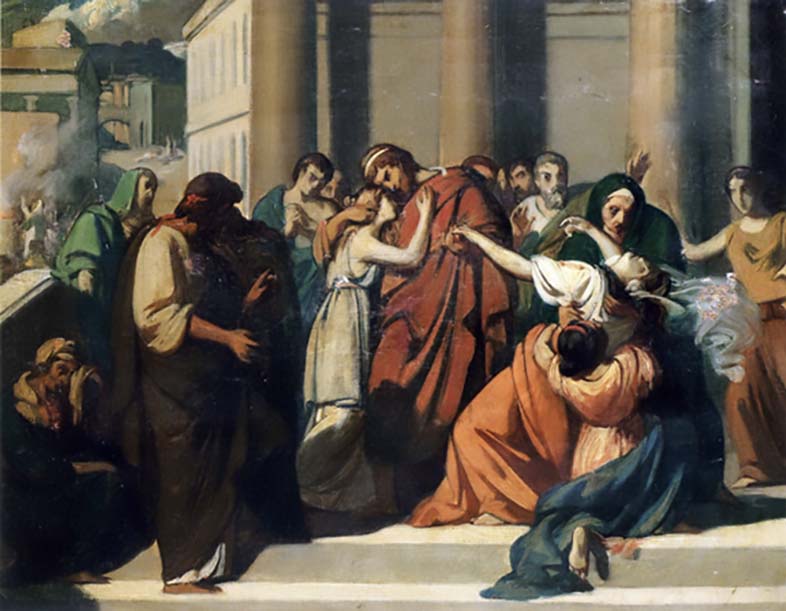Jocasta
Overall, In Greek mythology, Jocasta, also rendered Iocaste (Ancient Greek: Ἰοκάστη) and also known as Epicaste (Ancient Greek: Ἐπικάστη), was a daughter of Menoeceus, a descendant of the Spartoi (Echion), and queen consort of Thebes.
She was the wife of first Laius, then of their son Oedipus, and both mother and grandmother of Antigone, Eteocles, Polynices and Ismene. She was also sister of Creon and mother-in-law of Haimon.
Jocasta's Story
Jocasta would marry the King of Thebes, Laius, son of Landacus, who had succeeded Amphion as king. Initially, Jocasta did not give birth to an heir for her husband, and as a result Laius visited an oracle to find out about the possibility of conceiving a son.
Laius received an oracle from Delphi which told him that he must not have a child with his wife, or the child would kill him and marry her; in another version, recorded by Aeschylus, Laius is warned that he can only save the city if he dies childless. One night, Laius became drunk and fathered Oedipus with Jocasta.
Jocasta handed the newborn infant over to Laius. Jocasta or Laius pierced and pinned the infant's ankles together. Laius instructed his chief shepherd, a slave who had been born in the palace, to expose the infant on Mount Cithaeron. Laius' shepherd took pity on the infant and gave him to another shepherd in the employ of King Polybus of Corinth. Childless, Polybus and his Queen, Merope (according to Sophocles, or Periboea according to Pseudo-Apollodorus), raised the infant to adulthood.
Oedipus grew up in Corinth under the assumption that he was the biological son of Polybus and his wife. Hearing rumors about his parentage, he consulted the Delphic Oracle. Oedipus was informed by the Oracle that he was fated to kill his father and to marry his mother. Fearing for the safety of the only parents known to him, Oedipus fled from Corinth before he could commit these sins.
Oedipus would travel far from Corinth, but in his journey he had to pass through the narrow pass at Phocis, and there Oedipus met Laius, and his herald Polyphontes. Oedipus failed to yield to Laius who wished to pass along the narrow road, and in the argument that followed, Oedipus killed Laius and his herald.
Thus, after a heated argument regarding right-of-way, Oedipus killed Laius, unknowingly fulfilling the first half of the prophecy. Oedipus would travel on to Thebes, by which time the news of Laius’ death had been received, but the manner of the king of Thebes' death was unknown.
Creon, brother of Jocasta, was acting as regent for Thebes, but Thebes was in trouble, for the Sphinx was ravaging the land. Creon was now advised that he should give the throne of Thebes, and Jocasta as wife, to whomever rid Thebes of the troublesome Sphinx.
Now many heroes faced the Sphinx but all were unable to solve the riddle uttered by the monstrous beast; but eventually Oedipus came to the Sphinx and solved the riddle. This was how Oedipus became King of Thebes, and also how he gained a wife, in the form of Jocasta, his own mother, just as the oracle had foretold.
Oedipus solved the sphinx's riddle, and the grateful city elected Oedipus as its new king. Oedipus accepted the throne and married Laius' widowed queen Jocasta, Oedipus’ actual mother, thereby fulfilling the second half of the prophecy. Jocasta bore her son four children: two girls, Antigone and Ismene, and two boys, Eteocles and Polynices.
However, the killing of the Sphinx did not end the troubles of Thebes though, for famine and plague descended upon the city. Tiresias proclaimed that the plague was due to the city’s guilt over the death of the former king Laius, but this plague could be lifted if someone willing died for the city.
In all this turmoil, Menoceus, the father of both Jocasta and Creon, heard the words of Tiresias, and threw himself from the city walls, sacrificing himself to lift the plague from the city.
Differing versions exist concerning the latter part of Jocasta's life. As the troubles of Thebes continued, and Oedipus vowed to uncover the reasons why his city was cursed. This hunt for the truth though, would only lead to the downfall of the searcher, for Oedipus quickly learnt that he was not the son of Polybus and Periboea, and that he had been adopted.
Menoetes then identified Oedipus as the boy he had been tasked with abandoning upon Mount Cithaeron; thus Oedipus now knew that he had killed his father and married his mother, just as had been foretold.
The news would see Oedipus gouge out his own eyes, and later, when he faced persecution from his own sons, Oedipus would curse the pair, a curse that would lead to the Seven Against Thebes, and ultimately the death of the two sons of Oedipus and Jocasta.
In the version of Sophocles, when his city was struck by a plague, Oedipus learned that it was divine punishment for his patricide and incest. Hearing this news, Jocasta hanged herself; a means of suicide common with many female figures in Greek mythology.
But in the version told by Euripides, Jocasta endured the burden of disgrace and continued to live in Thebes, only committing suicide after her sons killed one another in a fight for the crown (for more see our article about Seven Against Thebes). In both traditions, Oedipus gouges out his eyes; Sophocles has Oedipus go into exile with his daughter Antigone, but Euripides and Statius have him residing within Thebes' walls during the war between Eteocles and Polynices.

Sources
Homer, Odyssey XI.271–290.
Apollodorus. Library, 3.5.7.
Sophocles, Oedipus Rex, 1191–1312.; Homer, Odyssey, Book XI
Statius, Thebaid, Book XI
Boccaccio (2003), p. xi
Seneca, Oedipus 1024–41.
Statius, Thebais XI.634–644.
"Wikipedia"
"Greek Legends and Myths"













